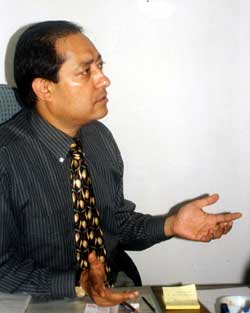 Nepali Times: So, do you miss the "French connection"?
Nepali Times: So, do you miss the "French connection"? Prithvi Pande: It is too early to tell. We as investors have taken the 50 percent shares belonging to Nepal Indosuez/Credit Agricole, the rest still belongs to Nepalis. Our major clients, international companies, INGOs, embassies, the UN institutions have told me they are very happy that the bank came to the so-called "Pande Group". We've only lost one big account, and even that was a domestic one.

We have to leave that behind us. We wanted to come into operation by about March, but eventually it was delayed by four months.
So there's no residual bad blood?
No, there cannot be. We are business people, and everybody is entitled to try and make a bid for anything. But once that is passed, what is the point having bad blood with anyone?
You have your own investment bank, now what?
We are hoping that we can get into investment banking activity, and this can only happen after capital is increased. We hope to get there in a year or so if the central bank allows us to. We are gearing up for that. We feel that if we can get into investment banking, it would contribute to the profits.
How will this be different from a commercial bank?
Investment banking will have long-term lending, which normally commercial banks are not supposed to do. They are supposed to borrow and lend short. We will be going into medium- and long-term lending. We also hope to underwrite (share) issues, go into acquisitions, mergers, etc and get brokerage. Because the economy is so small we have to do both commercial and investment banking. We hope also to do equity investments, if there is a big project coming up we can act as promoters.
The Rastra Bank says it is going to be very strict about regulating commercial banks, how are going to cope with that?
The Rastra Bank is a sleeping giant that has woken up. They have been activated now with a more dynamic governor, and of course the World Bank and IMF are waving the stick. But the central bank sometimes tends to go overboard. If someone has been involved in insider lending, why have they not been punished? The tendency is to punish everybody not just the ones involved in impropriety. Recently they said you cannot borrow if you are promoters with over one percent stock. This is not correct. In a liberalised economy anybody should have the right to borrow anywhere. What they could have said is: if an investor borrows and does not pay then we will take action. I think commercial banks are being over-regulated.
Isn't the size of the pie shrinking with 16 banks already here.
The pie is definitely shrinking, trade has come down, hotels are being subsidised by the central bank. This bank is small and the capital is high. This bank after the rights issue will have capital of Rs 520 million. Despite having a big name, this bank was underperforming, mainly because of the country risk in Nepal for which they had to have provisioning at head office.
How can you grow bigger?
Being a Nepali bank we have more access to investment opportunities. We don't want to keep a low profile. But this is clearly not the right time to rush into things. We have to find a balance, we need to increase the size of the bank and hope we can grow in the next two years by at least 40-50 percent.
What investment opportunities are there, given that this country is awash in cash but has no investors?
I am not looking at it from that perspective. My perspective is that this bank has capital, the rest of the banks are already up to their necks in lending. The new NRB rules and requirements are stringent. Capital adequacy has to be 10 percent this coming year. That is the opportunity for us, our capital adequacy is nearly 14-15 percent. So some of the good clients of other banks have to find new lenders. And that is our opportunity.
What needs to change, in the economy and in government policy?
We are concerned with the economy, which is clearly related to the political scenario in two ways: one is the behaviour of the politicians themselves and the other is the Maoist insurgency. I'm not in a position to say if the insurgency will be settled in the three years, I think it may take longer than that. But the political side can be settled very quickly, if there is the will.
There is a silver lining?
Let's say the insurgency goes on but is isolated in certain regions, then I think tourism will rebound. I feel that 50 percent of the problems we face are of our own making, the nation needs to progress. But I also feel the business community needs to get over petty interests and see the broader interests of the country. We want all facilities from government, but don't want to pay taxes. We expect other country's taxpayers to take care of us.
It's a Catch-22: you need to attract investment, which need tax breaks. We need investment to generate employment. The bottom line is to launch a massive employment generation campaign. I am investing in Nepal now, because this is my country. It is still a reasonable profession to get into, and you are helping your country out. People who are investing here believe in Nepal and are loyal to the country.


